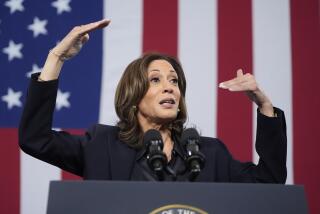Key Union Panel Urges AFL-CIO Backing for Clinton : Labor: The federation is expected to endorse him at a meeting next month. The candidate, due in California on Wednesday, still has voice problems.
- Share via
LITTLE ROCK, Ark. — Democratic front-runner Bill Clinton’s voice was still at rest Monday, but his campaign for the nomination picked up steam as the AFL-CIO neared an endorsement of him.
About 20 of the labor group’s vice presidents, meeting in Washington, recommended that their governing board throw the full weight of the 14.2-million-member federation behind the Arkansas governor. The board is expected to act at its May 5 meeting.
AFL-CIO President Lane Kirkland said at a press conference that AFL-CIO members nationwide think “now is the time to act.”
He said recession-weary union members “want a new Administration in the White House--one that cares about working people and will work to improve their lives.” Endorsing Clinton is the best way to accomplish that goal, he said.
Clinton, emerging from a visit to his physician’s office in Little Rock, reacted by saying softly: “Well, I want to unify the party and I appreciate that. I realize I’m not their first choice, but I hope we have a unified effort.”
Clinton also criticized President Bush for “playing politics” by issuing an executive order barring unions from using the dues of non-members for political activities.
But he added that he agrees with the fundamental principle enunciated by the U.S. Supreme Court in a 1988 ruling, which Bush’s order would enforce.
After a midday examination of his larynx by Dr. James Suen, Clinton canceled a Monday evening departure to Philadelphia, where he was to have delivered what aides called a “major” economic address today.
Clinton is still scheduled to fly to California for campaign events and fund-raisers on Wednesday and Thursday, campaign officials said.
“I still have some real problems,” Clinton told reporters after his examination. “My vocal chords are real bad. The doctor says that there has been real improvement in the last three or four days. But I didn’t get into this mess overnight and I won’t get out of this mess overnight.”
Suen, in a statement released by Clinton’s campaign headquarters, confirmed that Clinton still “has chronic laryngitis from overuse of his voice” and that his vocal chords still have “some swelling.”
“I recommended that he delay the resumption of his campaign schedule for another day and that he continue to avoid overuse of his voice during the campaign,” Suen said.
Despite his respite in Little Rock, the Clinton campaign got a boost in Washington with the recommendation of the AFL-CIO vice presidents. The endorsement recommendation was the latest evidence that the Democratic Party and its activist groups are rallying around Clinton, who holds a commanding lead in delegates over his rival, former California Gov. Edmund G. (Jerry) Brown Jr. Clinton has 1,276 delegates to Brown’s 264, according to an Associated Press tally. To win the nomination, 2,145 delegates are needed.
Last week, after he won four primaries in one day--in New York, Wisconsin, Kansas and Minnesota--Clinton was endorsed by House Majority Leader Richard A. Gephardt (D-Mo.) and Sen. John D. (Jay) Rockefeller IV (D-W. Va.), both superdelegates to the Democratic National Convention in July. Superdelegates are not bound by their state’s primary or caucus; rather, they are not bound to any candidate.
Endorsements aren’t coming from all quarters, however. On Monday, Pennsylvania Gov. Robert P. Casey warned that the Democratic Party is ignoring voters’ uneasiness with Clinton “at its peril” and urged party leaders to remain uncommitted until the national convention.
Casey, a superdelegate, says he plans to remain uncommitted until the convention in July. Clinton is preparing to campaign for Pennsylvania’s April 28 primary.
Casey cited polls that show voters are unhappy with the choices and most voters stayed home. “We’re not making this up,” Casey told reporters in Harrisburg, Pa. “Read the polling data. The unease of the American people and Democrats about Gov. Clinton is as plain as the nose on your face. What I’m saying is that the party disregards that at its peril.”
But Kirkland, in Washington, said the labor movement’s backing should help Clinton start focusing on the fall election against Bush.
Some union leaders had hesitated to back Clinton because he comes from a right-to-work state and has what they regard as a pro-business record.
But Kirkland said that in Monday’s meeting “there was no reluctance in endorsing” Clinton and that he doesn’t expect anyone else to enter the race.
“I have no sense of there being some white knight out there that would lead us to the promised land,” he said.
Clinton himself, in comments about Bush’s executive order, demonstrated both why some labor leaders remain wary of him, and why he will probably win their support anyway. His campaign headquarters in Little Rock issued a statement in his name criticizing Bush for “playing politics.”
Referring to the 1988 Supreme Court decision, Clinton’s statement said: “The Beck decision was a fair decision, and it has been the law of the land for nearly four years. Most American unions have incorporated its finding into their existing practices.”
But Clinton added: “President Bush could have signed this order at any time since the decision was handed down. The fact that he waited until now is clear evidence that President Bush is playing politics with labor instead of providing real leadership for our workers. If President Bush really cared, he’d be creating jobs for America’s workers instead of picking fights with our unions.”
More to Read
Get the L.A. Times Politics newsletter
Deeply reported insights into legislation, politics and policy from Sacramento, Washington and beyond. In your inbox three times per week.
You may occasionally receive promotional content from the Los Angeles Times.










